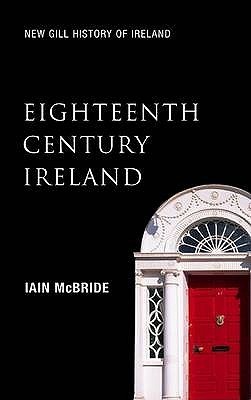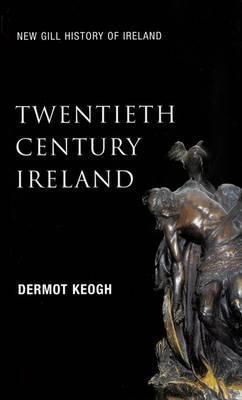


New Gill History of Ireland
Series · 6 books · 1988-2014
Books in series

#1
Medieval Ireland
The Enduring Tradition
1988
An overview of Irish society from the coming of Christianity in the fourth century to the Reformation in the sixteenth. Such a broad survey reveals features otherwise not easily detected. For all the complexity of political developments, Irish society remained basically stable and managed to withstand the onslaught of both the Vikings and the English. The inherent strength of Ireland consisted in the cultural heritage from pre-historic times, which remained influential throughout the centuries discussed here.
Irish history has traditionally been described either in isolation or in the manner in which it was influenced by outside forces, especially by England. This book strikes a different balance. First, the time span covered is longer than usual, and more attention is paid to the early medieval centuries than to the later period. Secondly, less emphasis is placed in this book on the political or military history of Ireland than on general social and cultural aspects. As a result, a more mature interpretation of medieval Ireland emerges, one in which social and cultural norms inherited from pre-historic times are seen to survive right through the Middle Ages. They gave Irish society a stability and inherent strength unparalleled in Europe.
"A new look at a period which has been studied more for its military and political activity than for anything else. This excellent book corrects the tilt by concentrating on social and cultural life." - Irish Independent.

#2
Sixteenth-century Ireland
The Incomplete Conquest
1995
In 1500, most of Ireland lay outside the ambit of English royal power. Only a small area around Dublin was directly administered by the crown. The rest of the island was run in more or less autonomous fashion by Anglo-Norman magnates or Gaelic chieftains. By 1600, there had been a huge extension of English royal power. First, the influence of the semi-independent magnates was broken; second, in the 1590s crown forces successfully fought a war against the last of the old Gaelic strongholds in Ulster. The secular conquest of Ireland was, therefore, accomplished in the course of the century. But the Reformation made little headway. The Anglo-Norman community remained stubbornly Catholic, as did the Gaelic nation. Their loss of political influence did not result in the expropriation of their lands. Most property still remained in Catholic hands. England's failure to effect a revolution in church as well as in state meant that the conquest of Ireland was incomplete. The seventeenth century, with its wars of religion, was the consequence.

#3
Seventeenth-Century Ireland (New Gill History of Ireland 3)
Making Ireland Modern - The Quest For a Settlement
2006
Well-established ideas of monarchy, social hierarchy and honor were under pressure in a fast-changing world. Political, religious, social and economic circumstances were all in flux. The common ambition of every faction was the creation of a usable focus of governance. Thus plantations, the constitutional experiments of Wentworth in the 1630s, the Confederation of the 1640s, the republican 1650s and the royalist reaction of the latter part of the century can be seen not simply as episodes in colonial domination but as part of an on-going attempt to find a modus vivendi within Ireland, often compromised by external influences. This book is not simply a narrative history of politics in seventeenth-century Ireland. It is a social history of governance that, while dealing with the main political, religious and economic developments, has at its interpretative core the process of making a new society out of competing factions.

#4
Eighteenth Century Ireland
The Isle of Slaves
2009
The eighteenth-century was the heyday of the Protestant ascendancy. McBride, however, acknowledges that the greatest advance in the history of the time has been the recovery of Catholic attitudes during the zenith of the ascendancy. McBride insists on the continuity of Catholic politics and traditions right through the century, so that the nationalist explosion in the 1790s is seen not as a sudden earthquake, but as the maturing of an underground tradition. This holistic survey cuts past the cliches and lazy thinking that has characterized our understanding of the eighteenth century. It sets a template for future understanding of that time.

#5
Nineteenth Century Ireland
The Search for Stability
2014
The search for stability proved elusive. Nationalist Ireland mobilised a mass democratic movement under O Connell to secure Catholic Emancipation before seeing its world transformed by the social cataclysm of the Great Famine. At the same time, the Protestant north-east of Ulster was feeling the first benefits of the Industrial Revolution. Although post-Famine Ireland modernised rapidly, only the north-east had a modern economy. The mixture of Protestantism and manufacturing industry integrated into the greater United Kingdom and gave a new twist to the traditional Irish Protestant hostility to Catholic political demands. In the home rule period from the 1880s to 1914, the prospect of partition moved from being almost unthinkable to being almost inevitable.
Nineteenth-century Ireland collapsed in the various wars and rebellions of 1912-22. Like many other parts of Europe than and since, it had proved that an imperial superstructure can contain domestic ethnic rivalries, but cannot always eliminate them.
a substantial and thoroughly crafted study of a very complex period . His virtues as a historian predominate clarity of thought and style, and a mastery of the telling quotation, which penetrates to the heart of the matter. The Irish Times

#6
Twentieth-century Ireland
Nation and state
1994
A revised and extended study of the long twentieth century, surveying politics, administrative history, social and religious history, culture and censorship, politics, literature and art. It presents an inclusive narrative, including the tragedy of emigration and its effect on the Irish psyche and on the under-performance of the Irish economy, the loss of opportunities for reform in the 1960s and early 70s, and the despair of the 1950s which revisited the country in the 1980s as almost an entire generation felt compelled to emigrate. Keogh also argues that the violence in Northern Ireland had a major impact on the government of the Irish state. He presents the crisis as an Anglo-Irish failure which was turned around only when the British government acknowledged that the Irish government had a vital role to play in the resolution of the problem. Keogh extends his analysis to include a wide-ranging survey of the most contentious events - financial corruption, child sexual abuse, scandals in the Catholic Church - between 1994 and 2005. "Here is a fair-minded political history which also embraces cultural developments. It seeks to write into Irish history those it feels had previously been written out ; migrant workers, emigrants, itinerants, religious minorities and that other half of the Irish race, women."-Sunday Tribune. "Dr Keogh's book stands as a mighty effort by one historian to help us understand our recent past and cut through the shibboleths."-The Irish Times.
Authors
David George Boyce
Author · 4 books
David George Boyce is a graduate of the Queen’s University of Belfast, where he also researched for his PhD. He is a fellow of the Royal Historical Society. He was an Archivist in the Department of Western Manuscripts, Bodleian Library Oxford, 1968-71, and then lectured in the Department of Politics and International relations in Swansea University from 1971 until 2004. He has written books and articles on modern British, Irish, imperial and military history and politics.
Raymond Gillespie
Author · 1 book
Raymond Gillespie is a Senior Lecturer in Modern History, National University of Ireland, Maynooth.